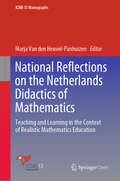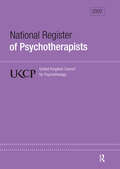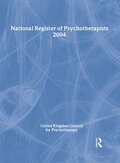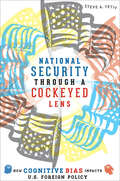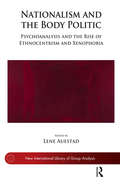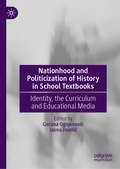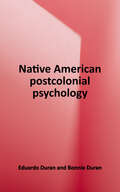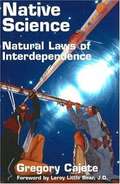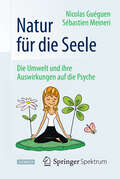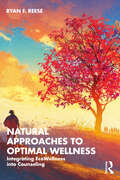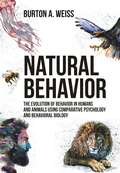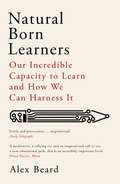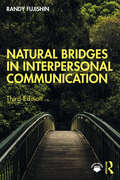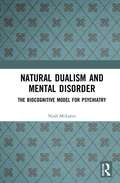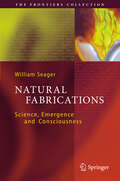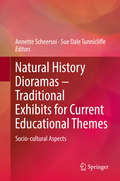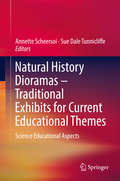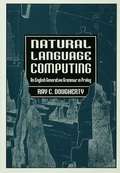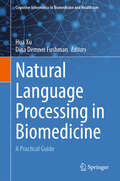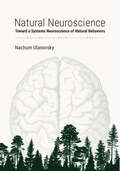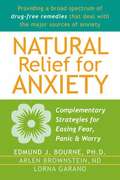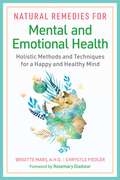- Table View
- List View
National Reflections on the Netherlands Didactics of Mathematics: Teaching and Learning in the Context of Realistic Mathematics Education (ICME-13 Monographs)
by Marja Van den Heuvel-PanhuizenThis open access book, inspired by the ICME 13 Thematic Afternoon on “European Didactic Traditions”, consists of 17 chapters, in which educators from the Netherlands reflect on the teaching and learning of mathematics in their country and the role of the Dutch domain-specific instruction theory of Realistic Mathematics Education.Written by mathematics teachers, mathematics teacher educators, school advisors, and developers and researchers in the field of instructional material, textbooks, and examinations, the book offers a multitude of perspectives on important issues in Dutch mathematics education, both at primary and secondary school levels. Topics addressed include the theoretical underpinnings of the Dutch approach, the subject of mathematics in the Dutch educational system, teacher education and testing, the history of mathematics education and the use of history in teaching of mathematics, changes over time in subject matter domains and in the use of technology, and the process of innovation and how the Dutch and in particular one Dutch institute have worked on the reform.
National Register of Psychotherapists 2000: UKCP United Kingdon Council of Psychotherapists
by Ukcp United Kingdom Council For PsychotherapyThe increase in public awareness of psychotherapy has resulted in an explosion of requests for information of this kind. The National Register of Psychotherapists is published to help; meet these requests by providing contact addresses for all those practising psychotherapists who have met the training requirements of organizations recognized by and affiliated to the United Kingdom Council for Psychotherapy. The National Register of Psychotherapists: Lists alphabetically and by county the names, addresses and telephone numbers of over 4,800 psychotherapists with recognized training qualifications. * Indicates the therapeutic orientation of each practitioner. * Lists names and addresses of over 75 psychotherapy organizations. * The Register is updated annually and provides a reliable source of reference for voluntary organizations, health authorities, hospitals, general practices, social work departments, public libraries and anyone who needs to get in touch with a trained psychotherapist. The United Kingdom Council for Psychotherapy (UKCP) is a registered charity. All psychotherapists on the National Register of Psychotherapists are required to adhere to the Codes of Ethics and Practice of their own organizations, which will have been approved by the UKCP.
National Register of Psychotherapists 2002
by Ukcp United Kingdom Council For PsychotherapyHow do I get in touch with a properly qualified psychotherapist? Is there a local list of names?The increase in public awareness of psychotherapy has resulted in an explosion of requests for information of this kind. The National Register of Psychotherapists is published to help meet these requests by providing contact addresses for all those practising psychotherapists who have met the training requirements of organisations recognised by and affiliated to the United Kingdom Council for Psychotherapy. The National Register of Psychotherapists:* Lists alphabetically and by county the names, addresses and telephone numbers of over 5,200 psychotherapists with recognised training qualifications* Indicates the therapeutic orientation of each practitioner* Lists names and addresses of over 80 psychotherapy organisationsThe Register is updated annually and provides a reliable source of reference for voluntary organisations, health authorities, hospitals, general practices, social work departments, public libraries and anyone who needs to get in touch with a trained psychotherapist.The United Kingdom Council for Psychotherapy (UKCP) is a registered charity. All psychotherapists on the National Register of Psychotherapists are required to adhere to the Codes of Ethics and Practice or their own organisations, which have been approved by the UKCP.
National Register of Psychotherapists 2004
by United Kingdom Council for PsychotherapistsThe increase in public awareness of psychotherapy has resulted in an explosion of requests for information of this kind. The National Register of Psychotherapists is published to help meet these requests by providing contact addresses for all those practising psychotherapists who have met the training requirements of organisations recognised by and affiliated to the United Kingdom Council for Psychotherapy.The National Register of Psychotherapists:* lists alphabetically and by county the names, addresses and telephone numbers of over 6,000 psychotherapists with recognised training qualifications* indicates the therapeutic orientation of each practitioner* lists the names and addresses of over 80 psychotherapy organisationsThe Register is updated annually and provides a reliable source of reference for voluntary organisations, health authorities, hospitals, general practices, social work departments, public libraries and anyone who needs to get in touch with a trained psychotherapist.The United Kingdom Council for Psychotherapy (UKCP) is a registered charity. All psychotherapists on the National Register of Psychotherapists are required to adhere to the Codes of Ethics and Practice of their own organisations, which have been approved by the UKCP.
National Security Through a Cockeyed Lens: How Cognitive Bias Impacts U.S. Foreign Policy
by Steve A. YetivA study examining how poor decision-making based on mental errors or cognitive biases hurts American foreign policy and national security.Author Steve A. Yetiv draws on four decades of psychological, historical, and political science research on cognitive biases to illuminate some of the key pitfalls in our leaders’ decision-making processes and some of the mental errors we make in perceiving ourselves and the world.Tracing five U.S. national security episodes?the 1979 Soviet invasion and occupation of Afghanistan; the Iran-Contra affair during the Reagan administration; the rise of al-Qaeda, leading to the 9/11 attacks; the 2003 U.S. invasion of Iraq; and the development of U.S. energy policy?Yetiv reveals how a dozen cognitive biases have been more influential in impacting U.S. national security than commonly believed or understood.Identifying a primary bias in each episode?disconnect of perception versus reality, tunnel vision (“focus feature”), distorted perception (“cockeyed lens”), overconfidence, and short-term thinking?Yetiv explains how each bias drove the decision-making process and what the outcomes were for the various actors. His concluding chapter examines a range of debiasing techniques, exploring how they can improve decision making.Praise for National Security through a Cockeyed Lens“Yetiv’s volume could be one of the key books for presidents and their advisers to read before they begin making decisions.” —William W. Newmann, H-Diplo“The principles in this book deserve wide recognition. Yetiv places necessary focus on lapses in decision making that are important to acknowledge.” —James Lebovic, Political Science Quarterly
National Security through a Cockeyed Lens: How Cognitive Bias Impacts U.S. Foreign Policy
by Steve A. YetivHow poor decision making hurts U.S. national security."How do mental errors or cognitive biases undermine good decision making?" This is the question Steve A. Yetiv takes up in his latest foreign policy study, National Security through a Cockeyed Lens.Yetiv draws on four decades of psychological, historical, and political science research on cognitive biases to illuminate some of the key pitfalls in our leaders’ decision-making processes and some of the mental errors we make in perceiving ourselves and the world.Tracing five U.S. national security episodes—the 1979 Soviet invasion and occupation of Afghanistan; the Iran-Contra affair during the Reagan administration; the rise of al-Qaeda, leading to the 9/11 attacks; the 2003 U.S. invasion of Iraq; and the development of U.S. energy policy—Yetiv reveals how a dozen cognitive biases have been more influential in impacting U.S. national security than commonly believed or understood. Identifying a primary bias in each episode—disconnect of perception versus reality, tunnel vision ("focus feature"), distorted perception ("cockeyed lens"), overconfidence, and short-term thinking—Yetiv explains how each bias drove the decision-making process and what the outcomes were for the various actors. His concluding chapter examines a range of debiasing techniques, exploring how they can improve decision making.
Nationalism and the Body Politic: Psychoanalysis And The Rise Of Ethnocentrism And Xenophobia (The New International Library of Group Analysis)
by Lene AuestadThis volume aims to question the recent revival of neo-nationalist policies in the light of what unconscious fantasies are involved in these developments. It examines both recent movements of right-wing extremism and the way in which rearticulated neo-ethnic ideas have been adopted by mainstream politicians and in mainstream public discourse. Politicians from other than the right-wing populist parties have tended to resist specific ways of talking that are considered too extremist, rather than their underlying frame of interpretation. Governments across Europe have adopted anti-immigrant and anti-Roma policies. Xenophobia and hostility towards 'others' is on the rise, along with appeals to "Tradition and Security". 'Cultures of fear' are linked with fantasies of fusion or 'imagined sameness'. Alongside the image of the nation as a mother and/or father, Reich (1933) called attention to the fantasy of the nation as a body, echoed in Money-Kyrle's (1939) characterization of 'group hypochondria' in connection with the burning of witches and heretics.
Nationhood and Politicization of History in School Textbooks: Identity, the Curriculum and Educational Media
by Gorana Ognjenović Jasna JozelićThis book explores how school history textbooks are used to perpetuate nationalistic policies within divided regions. Exploring the ‘divide and rule’ politics across ex-Yugoslav successor states, the editors and contributors draw upon a wide range of case studies from across the region. Textbooks and other educational media provide the foundations upon which the new generation build understanding about their own context and the events that are creating their present. By promoting nationalistic politics in such media, textbooks themselves can be used as tools to further promote and preserve ongoing hostility between ethnic groups following periods of conflict. This edited collection will appeal to scholars of educational media, history education and post-conflict societies.
Native American Postcolonial Psychology (SUNY Series In Transpersonal And Humanistic Psychology)
by Eduardo Duran Bonnie DuranThis book shows that it is necessary to understand intergenerational trauma and internalized oppression in order to understand Native Americans today. It makes native American ways of conceptualizing the world available to readers.
Native American Postcolonial Psychology (Suny Series In Transpersonal And Humanistic Psychology Ser.)
by Eduardo Duran Bonnie DuranThis book shows that it is necessary to understand intergenerational trauma and internalized oppression in order to understand Native Americans today. It makes native American ways of conceptualizing the world available to readers.
Native Science: Natural Laws of Interdependence
by Gregory CajeteCajete examines the multiple levels of meaning that inform Native astronomy, cosmology, psychology, agriculture, and the healing arts. Unlike the western scientific method, native thinking does not isolate an object or phenomenon in order to understand it, but perceives it in terms of relationship. An understanding of the relationships that bind together natural forces and all forms of life has been fundamental to the ability of indigenous peoples to live for millennia in spiritual and physical harmony with the land. It is clear that the first peoples offer perspectives that can help us work toward solutions at this time of global environmental crisis.
Natur für die Seele: Die Umwelt und ihre Auswirkungen auf die Psyche
by Jutta Bretthauer Nicolas Guéguen Sébastien MeineriIn den vergangenen zehn Jahren gab es zahlreiche Forschungsexperimente auf dem Gebiet der Psychologie in Verbindung mit Ökologie und Umwelt. Anhand von ca. 100 Experimenten zeigt dieses populärwissenschaftliche Werk auf amüsante Weise, welchen Einfluss die physische Umwelt auf den Menschen hat. Zum Beispiel werden die Auswirkungen von Baumalleen und Blumen entlang von Gehwegen und deren Auswirkungen auf Passanten in Bezug auf das Sicherheitsempfinden und Kriminalitätsaufkommen entschlüsselt. Auch der Einfluss von Blumen und Pflanzen auf die Atmosphäre am Arbeitsplatz sowie der Effekt in Krankenzimmern wird aufschlussreich beleuchtet.
Natural Approaches to Optimal Wellness: Integrating EcoWellness into Counseling
by Ryan F. ReeseNatural Approaches to Optimal Wellness: Integrating EcoWellness into Counseling offers a groundbreaking perspective on holistic human wellness by introducing the EcoWellness framework to counselors and psychotherapists.The book integrates discussion of nature's therapeutic benefits with an understanding of clients' broader ecological and sociocultural contexts. It addresses foundational professional issues, such as the clinician's scope of practice, ethics, and nature worldview, and explores the empirical and conceptual bases of the EcoWellness model through a comprehensive review of the multidisciplinary literature and supporting theories. Interspersed with the author's own clinical experience, the book offers practical examples for applying the EcoWellness perspective in counseling and psychotherapy. With a roadmap for ethical EcoWellness counseling practice, including assessment, treatment planning, specialized strategies, and advocacy, this book equips professionals with tools to enhance client wellness, advocate for environmental and climate justice, and foster a deep, respectful connection to the more-than-human world.This essential guide equips counselors and psychotherapists with innovative, inclusive, and effective practices to enhance client wellness and foster restorative connections with the natural world.
Natural Behavior: The Evolution of Behavior in Humans and Animals using Comparative Psychology and Behavioral Biology
by Burton A. WeissNatural Behavior provides seminal insights into the evolution of animal and human behavior for enthusiasts of Comparative Psychology and Behavioral Biology. Evolution and the behavior of the animal kingdom are discussed with new concepts on science, learning and instinct, and population phenomena. Hominization, interaction with Neanderthals, how the brain evolved, and the impact on the World are described with new views.The origin of our scientific concepts and the trend away from the egocentric position, placing humans at the center of the universe, is considered, along with the status of religion and how the fit with science is positive. This volume carefully explains evolution and the central role of behavior in natural selection. The range of animal behavior from single cells to people is covered, as are, topics like European settling of the New World first, and the effects of humans on the planet.
Natural Born Learners: Our Incredible Capacity to Learn and How We Can Harness It
by Alex BeardLearning is the soul of our species. From our first steps to our last words, we are what we learn. But for all its obvious importance, learning has lost touch with human progress. We live in an information age, work in a knowledge economy, yet our schools are relics of an industrial era. Education insider Alex Beard takes us on a dazzling tour of the future of learning to show how we can - and why we must - do better. Tackling everything from artificial intelligence to our growing understanding of the infant brain, Natural Born Learners is a user's guide to transforming learning in the twenty-first century and roadmap to accessing our better future selves.
Natural Bridges in Interpersonal Communication
by Randy FujishinWith a particularly student-friendly and engaging style, this third edition gives readers the fundamental tools necessary to effectively communicate in interpersonal interactions. Natural Bridges in Interpersonal Communication, Third Edition, is a concise and practical book that introduces students to the basic concepts and skills of interpersonal communication in both face-to-face and online interactions in personal and professional settings. Each chapter features human interest stories and review exercises to help students better understand the concepts covered. This edition continues its expanded coverage of foundational research and devotes additional space to discussions of cultural safety, race and ethnicity, issues of mental health, and technology and social media. This textbook is designed for communication studies, business, and career and trade courses in interpersonal communication and communication skills at the community college and four-year university levels. Online instructor materials that accompany the book include an instructor’s manual, sample exams, and a sample class schedule. They are available at www.routledge.com/9781032355054.
Natural Dualism and Mental Disorder: The Biocognitive Model for Psychiatry
by Niall McLarenThis book presents an integrative, dualist model of mental disorder for psychiatry, as a counter to the so-called "biomedical" approach that dominates the field today. Starting with the humanist concept that mental disorder is real, it uses a computational approach to build a genuinely bio-psycho-social model. This shows that mental disorder is primarily psychological in nature, not biological. The historical background extends as far as Descartes, and proceeds via some of the revolutionary thinkers who have shaped modern society. In particular, it builds on the work of George Boole, Alan Turing and Claude Shannon to construct a radically new concept of the mind as a real, informational space which, for better off for worse, can malfunction. It extends this idea to build models of personality, of personality disorder, and then of mental disorder. Finally, the concepts are tested against a variety of themes from other fields to show its generality. Based in the philosophy of science and of mind, this work represents a radical departure from anything in the history of psychiatry. Its purpose is to provide a formal, articulated model of mental disorder to fill the theoretical void at the core of modern psychiatry. This book is written for medical students and recent graduates, for psychiatrists, psychologists, social workers and, broadly, anybody with an interest in human affairs, such as philosophy, politics and other related fields.
Natural Fabrications
by William SeagerThe spectacular success of the scientific enterprise over the last four hundred years has led to the promise of an all encompassing vision of the natural world. In this elegant picture, everything we observe is based upon just a few fundamental processes and entities. The almost infinite variety and complexity of the world is thus the product of emergence. But the concept of emergence is fraught with controversy and confusion. This book ponders the question of how emergence should be understood within the scientific picture, and whether a complete vision of the world can be attained that includes consciousness.
Natural History Dioramas – Traditional Exhibits for Current Educational Themes: Science Educational Aspects
by Sue Dale Tunnicliffe Annette ScheersoiThis book focuses on socio-cultural issues and the potential of using dioramas in museums to engage various audiences with – and in – contemporary debates and big issues, which society and the natural environment are facing, such as biodiversity loss.From the early 1900s, with the passage of time and changes in cultural norms in societies, this genre of exhibits evolved in response to the changes in entertainment, expectations and expressed needs of museum visitors. The challenge has always been to provide meaningful, relevant experiences to visitors, and this is still the aim today. Dioramas are also increasingly valued as learning tools. Contributions in this book specifically focus on their educational potential. In practice, dioramas are used by a wide range of educational practitioners to assist learners in developing and understanding specific concepts, such as climate change, evolution or or conservation issues. In this learning process, dioramas not only contribute to scientific understanding and cultural awareness, but also reconnect wide audiences to the natural world and thereby contribute to the well-being of societies.In the simultaneously published book: “Natural History Dioramas – Traditional Exhibits for Current Educational Themes, Science Educational Aspects" the editors discuss the history of dioramas and their building and science learning aspects, as well as current developments and their place in the visitor experience.
Natural History Dioramas – Traditional Exhibits for Current Educational Themes: Science Educational Aspects
by Sue Dale Tunnicliffe Annette ScheersoiThis book presents the history of natural history dioramas in museums, their building and science learning aspects, as well as current developments and their place in the visitor experience. From the early 1900s, with the passage of time and changes in cultural norms in societies, this genre of exhibits evolved in response to the changes in entertainment, expectations and expressed needs of museum visitors. The challenge has always been to provide meaningful, relevant experiences to visitors, and this is still the aim today. Dioramas are also increasingly valued as learning tools. Contributions in this book specifically focus on their educational potential. In practice, dioramas are used by a wide range of educational practitioners to assist learners in developing and understanding specific concepts, such as climate change, evolution or or conservation issues. In this learning process, dioramas not only contribute to scientific understanding and cultural awareness, but also reconnect wide audiences to the natural world and thereby contribute to the well-being of societies.In the simultaneously published book: “Natural History Dioramas – Traditional Exhibits for Current Educational Themes, Socio-cultural Aspects” the editors focus on socio-cultural issues and the potential of using dioramas to engage various audiences with – and in – contemporary debates and big issues, which society and the natural environment are facing.
Natural Language Computing: An English Generative Grammar in Prolog
by Ray C. DoughertyThis book's main goal is to show readers how to use the linguistic theory of Noam Chomsky, called Universal Grammar, to represent English, French, and German on a computer using the Prolog computer language. In so doing, it presents a follow-the-dots approach to natural language processing, linguistic theory, artificial intelligence, and expert systems. The basic idea is to introduce meaningful answers to significant problems involved in representing human language data on a computer.
Natural Language Processing in Biomedicine: A Practical Guide (Cognitive Informatics in Biomedicine and Healthcare)
by Hua Xu Dina Demner FushmanThis textbook covers broad topics within the application of natural language processing (NLP) in biomedicine, and provides in-depth review of the NLP solutions that reveal information embedded in biomedical text. The need for biomedical NLP research and development has grown rapidly in the past two decades as an important field in cognitive informatics. Natural Language Processing in Biomedicine: A Practical Guide introduces the history of the biomedical NLP field and takes the reader through the basic aspects of NLP including different levels of linguistic information and widely used machine learning and deep learning algorithms. The book details common biomedical NLP tasks, such as named entity recognition, concept normalization, relation extraction, text classification, information retrieval, and question answering. The book illustrates the tasks with real-life use cases and introduces real-world datasets, novel machine learning and deep learning algorithms, and large language models. Relevant resources for corpora and medical terminologies are also introduced. The final chapters are devoted to discussing applications of biomedical NLP in healthcare and life sciences. This textbook therefore represents essential reading for students in biomedical informatics programs, as well as for professionals who are conducting research or building biomedical NLP systems.
Natural Neuroscience: Toward a Systems Neuroscience of Natural Behaviors
by Nachum UlanovskyA new approach to brain research that emphasizes studying the brain under naturalistic conditions.Natural neuroscience departs from the classical reductionist approach, which emphasizes control at the expense of natural behaviors, by proposing a shift toward real-world relevance, natural behaviors, and ecological validity. In Natural Neuroscience, Nachum Ulanovsky presents the conceptual, empirical, and technological underpinnings that enabled this new field. Natural neuroscience researchers posit that when studying any brain region in any animal, whether standard mammalian species such as rodents and primates or nonstandard species, it is crucial to pursue the animal&’s natural behaviors and to consider the natural problems it needs to solve. By preventing rich natural behaviors, says Ulanovsky, we miss key aspects of brain function—and we may not even know what we miss.The author surveys recent studies that have begun to move in this direction across multiple subfields of neuroscience, including sensory, cognitive, social, and behavioral neuroscience. He discusses technological advances that are allowing the pursuit of more naturalistic experiments, including methods for recording neural activity in freely behaving, freely moving animals (e.g., wired and wireless electrophysiology and imaging); methods for manipulating neural activity in freely moving animals (e.g., wired and wireless optogenetics); and methods for quantifying the details of behavior. He makes connections across the four major scientific disciplines that focus on understanding behavior—neuroscience, behavioral ecology, ethology, and psychology—bringing them closer together, and closer to real life.
Natural Relief for Anxiety: Complimentary Strategies for Easing Fear, Panic, and Worry
by Lorna Garano Edmund J. Bourne Arlen BrownsteinBack Cover: "Twenty-five million Americans suffer from diagnosable anxiety disorders, and millions more struggle with occasional feelings of fear, panic, and worry. Pharmaceutical companies spend billions each year developing drugs to counteract these feelings, but the truth is that there is no "magic pill" that can make anxiety go away. Anxiety treatments that rely on medication have a high incidence of relapse when the medication stops. And the side effects of these drugs can be more debilitating than the condition they were designed to treat. An alternative and more lasting way to control anxiety is to make gentle, natural changes to your lifestyle that promote wellness in mind and body. Written by the best-selling author of The Anxiety and Phobia Workbook and a naturopathic physician, this book offers you a complete strategy for overcoming anxiety without drugs. Begin by taking a look at the choices you make every day about your lifestyle and general well-being. Calm your anxious mind with healthy self-talk. Learn the importance of exercise and a healthy, natural diet in controlling anxiety. Discover techniques that promote deep physical relaxation. Find out which nutritional supplements and natural therapies can help you on your way to renewed peace of mind. Explore ways you can simplify your life to reduce stress. The book offers a broad range of self-care resources as well as information about how and when to seek outside help. Complementary treatment approaches: * Relaxation, exercise, and diet improvement * Herbs and nutritional supplements * Massage and bodywork * Chiropractic care * Mindfulness meditation, yoga, and t'ai chi * Homeopathic and naturopathic medicine," and spirituality.
Natural Remedies for Mental and Emotional Health: Holistic Methods and Techniques for a Happy and Healthy Mind
by Chrystle Fiedler Brigitte MarsA self-care guide to treating mental, emotional, and neurological conditions• Explores common mental health concerns and stress-related issues—such as anxiety, depression, anger, insomnia, brain fog, and trauma—and shares remedies and practices to address and heal their root causes • Examines the influence of diet and nutrition on mental health and the benefits of specific foods, herbs, supplements, essential oils, and self-care techniques • Details holistic remedies for neurological conditions, such as ADHD, epilepsy, addiction, bipolar disorder, PTSD, multiple sclerosis, Parkinson&’s disease, traumatic brain injury (TBI), and stroke Mental health and emotional well-being are just as important as physical health. And like physical health, there are many simple ways to improve and support mental wellness with the healing power of herbs and other holistic remedies and practices. In this comprehensive guide to natural methods to maintain a healthy mind, herbalist Brigitte Mars and natural health expert Chrystle Fiedler explore many common mental health concerns and stress-related issues—such as anxiety, depression, panic attacks, anger, insomnia, brain fog, and trauma—and share remedies and practices to address and heal their root causes. Citing recent medical studies, they examine the influence of diet and nutrition on mental health concerns and explore the benefits of specific foods, herbs, supplements, essential oils, and self-care techniques like acupressure, massage, and color therapy. The authors also explore holistic practices and treatments for moving through grief, breaking free from addiction, working with ADHD and epilepsy, supporting chronic conditions like bipolar disorder, PTSD, and Parkinson&’s disease, and recovering from traumatic brain injury (TBI) and stroke. Presenting a wealth of holistic self-care therapies for mental well-being, emotional balance, and neurological health, this guide enables each of us to heal the mind and nurture the soul, two essential keys to a happy, joyful life.
